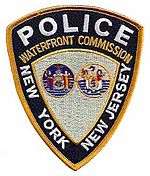Waterfront Commission of New York Harbor
The Waterfront Commission of New York Harbor (WCNYH) is a regulatory agency in Port of New York and New Jersey in the United States. The bi-state agency was founded in 1953 by a Congressional authorized compact between New York and New Jersey "for the purpose of eliminating various evils on the waterfront in the Port of New York Harbor." Under statutory mandate, the mission of the commission is to investigate, deter, combat and remedy criminal activity and influence in the port district and also ensures fair hiring and employment practices. New Jersey attempted to withdraw from the pact in 2018.[1]
History
The commission was set up in August 1953 (a year before the movie On the Waterfront) to combat labor racketeering.[2] The commission was initially created to combat unfair hiring practices on the waterfront in response to the growing number of crimes being committed there.
Division of Licensing and Employment Information Centers
The Division of Licensing and Employment Information Centers is responsible for screening, registering, and licensing individuals who are interested in working at the dock. The commission is authorized to deny or revoke the registration or licenses of those who involve themselves in criminal activity.
Police Division

The Police Division operates in Manhattan and Brooklyn.
The Waterfront Commission of New York Harbor cooperates with various state, federal, and local law enforcement authorities in pursuing investigations into waterfront-related crimes. The Waterfront Commission participated in the investigation of criminal activities by the leaders and members of the Gambino crime family and union leaders. Charges of racketeering conspiracy, extortion, theft of union benefits, mail fraud, false statements, loansharking, embezzlement of union funds, money laundering, and illegal gambling, dating back over three decades, were brought forth by the United States District Court for the Eastern District of New York in February 2008 against leaders of the Gambino crime family, their associates, and union officials.[3] The Police Division utilizes numerous vehicles in its vehicle fleet, including marked police cars and trucks.[4][5]
New York State Inspector General report
On August 11, 2009, the New York State Inspector General Joseph Fisch issued a report of his two-year investigation of the Waterfront Commission. The report detailed extensive illegal, corrupt and unethical behavior on the part of Waterfront Commission staff. Following release of the report, the large majority of the Commission's executive staff was fired, including the New Jersey Commissioner Michael J. Madonna (the New York Commissioner's seat was vacant at the time of the report's release, although the report faulted the actions of the former New York Commissioner, Michael C. Axelrod).[6][7]
The report's existence was due, in part, to two whistleblowers, Kevin McGown and Brian Smith, who both resigned and have since filed a discrimination complaint against the agency.[8]
New Jersey withdrawal from pact
In October 2014, the New Jersey Senate passed measure S-2277 which would direct the governor of New Jersey to withdraw from the bi-state compact and transfer the commission's oversight responsibilities in New Jersey to the state police.[9] In May 2015, Governor Chris Christie conditionally vetoed S-2277 (and the corresponding bill A-3506 passed by the New Jersey General Assembly), citing his concerns that the state lacked the authority to withdraw from the compact and arguing that the solution should be to modify the operations of the commission to minimize interference with waterfront operations.[10]
Among his final actions in January 2018 before leaving office, Christie signed legislation allowing the state to withdraw from pact.[11][1]
References
- "N.J. officials take a step back in controversial port fight". NJ.com. January 23, 2018. Retrieved January 24, 2018.
- "Waterfront Commission disputes lawsuit by union and shippers charging hiring interference". NJ.com. Retrieved May 8, 2016.
- Press Release, United States Attorney's Office - Eastern District of New York, February 7, 2008.
- "Police Car Web Site". Retrieved 8 May 2016.
- "Waterfront Commission of New York Harbor (WCNYH)". www.wcnyh.gov.
- "Corruption Found at Waterfront Watchdog". The New York Times. August 12, 2009. Retrieved May 8, 2016.
- Inspector General's Investigation Report
- "Whistleblowers On the Waterfront". The Village Voice. 2009-09-15.
- Strunsky, Steve (October 10, 2014). "Bill to dissolve Waterfront Commission approved by N.J. Senate panel". The Star-Ledger. Retrieved October 14, 2014.
- Strunsky, Steve. "Christie acts on bill to dissolve the Waterfront Commission", NJ Advance Media for NJ.com, May 4, 2015. Accessed January 16, 2018. "Gov. Chris Christie rejected legislation intended to dissolve the Waterfront Commission of New York Harbor, siding with officials of the agency who insist New Jersey cannot unilaterally undo what the two states and Congress did 62 years ago to rid the docks of organized crime.... Christie, a former U.S. attorney for New Jersey whose office handled organized crime cases, recommended that instead of trying to dissolve the commission, lawmakers instead push for bi-state legislation tailoring the commission's role in the hiring process to prevent excessive interference. 'While I am not unsympathetic to the merits of the bill, I am advised that federal law does not permit one state to unilaterally withdraw from a bi-state compact approved by Congress,' read a statement from Christie accompanying his conditional veto."
- Livio, Susan K.; and Johnson, Brent. "Chris Christie's final acts: Bills he made law and killed, from drones to circus animals", NJ Advance Media for NJ.com, January 15, 2018. Accessed January 16, 2018. "Christie agreed to allow New Jersey to withdraw from the Waterfront Commission of New York Harbor, created more than 60 years ago to drive out organized crime. The New Jersey State Police will now handle the duties associated with screening the employees who work on the docks."
External links
- Waterfront Commission of New York Harbor home page
- Annual report, The Waterfront Commission of New York Harbor 1994-2003.
- New York Times articles about WCNYH